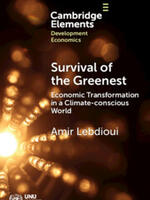Filter by...
Reset all
Publications (8621)
Journal Article
This peer-reviewed research is available free of charge. UNU-WIDER believes that research is a global public good and supports Open Access.
This study examines the trajectory of global income inequality since 1981. Commonly used (relative) definitions indicate a decline in global inequality since the late 1980s. Looking ahead, it has been intuited that the influence of China's economic development — and that of other rapidly growing...
Journal Special Issue
This peer-reviewed research is available free of charge. UNU-WIDER believes that research is a global public good and supports Open Access.
Political clientelism — which reflects strategic, discretionary, and targeted exchange of private goods and services for political support to the incumbent — has characterised distributive politics in the Global South for decades. The conditional nature of exchange between political parties and...
Journal Article
This peer-reviewed research is available free of charge. UNU-WIDER believes that research is a global public good and supports Open Access.
– Resource rents, fiscal capacity and political institutions in developing economies
While it is recognised that the ability of states to raise revenues (i.e., fiscal capacity) is important for the provision of key public goods in less developed economies, it is less clear what its determinants are and what explains cross-country differences. We focus on the impact of natural...
Blog
More than 960 million Indians will head to the polls in the world’s biggest election between April 19 and early June. The ruling Bharatiya Janata Party (BJP), which is led by Prime Minister Narendra Modi, is seeking a third term in office. And the polls suggest it will achieve this objective.If one...

In Mozambique, analysing how and why food prices change is crucial. Understanding the dynamics of price formation is fundamental to mitigate the adverse effects of price volatility to the economy. Detailed data on the prices of key food items in Mozambique is, however, limited in both quantity...
Blog
In monetary policy communication, every word carries weight. Consider this scenario: the South African Reserve Bank (SARB) articulates its stance to anchor inflation expectations, yet this message undergoes subtle transformations when translated by the media and financial analysts. How do divergent...
Blog
Evidence from Brazil shows how affirmative action students in the higher education system adjust their behaviour to catch up with initially higher-performing privileged students.Affirmative action (AA) policies, aiming to address historical inequalities and promote social justice, have sparked...

– The new structural financial economics framework
The primary role of finance is to serve the ‘real economy’¬—the part of the economy that produces goods and services. Yet in practice, the financial sector often excessively indulges in speculative activities rather than performing its main functions, such as channeling saving for productive...

– Economic Transformation in a Climate-Conscious World
IN PRODUCTION | SCHEDULED FOR PUBLICATION APRIL 2024The pathways to economic development are changing. Environmental sustainability is no longer a choice but a necessity to maintain a competitive edge in the global economy. Just like in nature, where survival hinges on adaptation, this publication...
Working Paper
pdf
– Re-thinking the use of unit values or community prices
Analysis of household food consumption patterns and welfare requires knowledge of household demand responses to changes in price and income. Estimation of the price and expenditure elasticities requires detailed data on household purchases and prices, which are often not available in many developing...
Working Paper
pdf
– Comparing the performance of universal basic income in Uganda and Zambia during COVID-19
The debate over universal basic income (UBI) has gained traction in the developing world in recent years. We analyse the effects of four UBI schemes on poverty and inequality measures during normal times and times of crisis in Uganda and Zambia. We use static microsimulation models and nationally...
Working Paper
pdf
Frequent electricity outages threaten to impede the benefits of expanded access achieved by many developing countries in recent decades. A large literature documents these negative effects, however almost none consider labour market effects. This paper merges labour force survey microdata with high...
Working Paper
pdf
Cross-border traders face a choice between official and unofficial border crossings. The latter allow them to evade taxes, but expose them to other risks, such as bribes, fines, and arrest. We investigate the perceptions of cross-border traders about the risks of trading officially vs unofficially...
Journal Article
This peer-reviewed research is available free of charge. UNU-WIDER believes that research is a global public good and supports Open Access.
– Evidence from the Sena Sugar Estates, 1920–74
ARTICLE IS ON EARLY VIEW | Forced wage labour (FWL) in colonial-era Portuguese Africa came to encompass a majority of working age men and persisted until the early 1960s. On the basis of reconstructed financial records from the Sena Sugar Estates in today's Mozambique, we estimate the long-run...
Journal Article
– Evidence from India
ARTICLE ON EARLY VIEW | This study analyses whether living in a locality with high crime against women affects the probability of early marriage — that is, marriage before the legal age of marriage of girls. Using a nationally-representative longitudinal dataset and tackling the potential...
Journal Article
– Examining the role of conventional banks in deepening access to formal credit
ARTICLE IS ON EARLY VIEW | Using a unique district-level panel dataset, we investigate the effect of banking system penetration on financial inclusion in Ghana. To purge potential endogeneity bias in the underlying relationship, we exploit a change in the policy environment of the Ghanaian banking...
Displaying 16 of 8621 results
 Join the network
Join the network